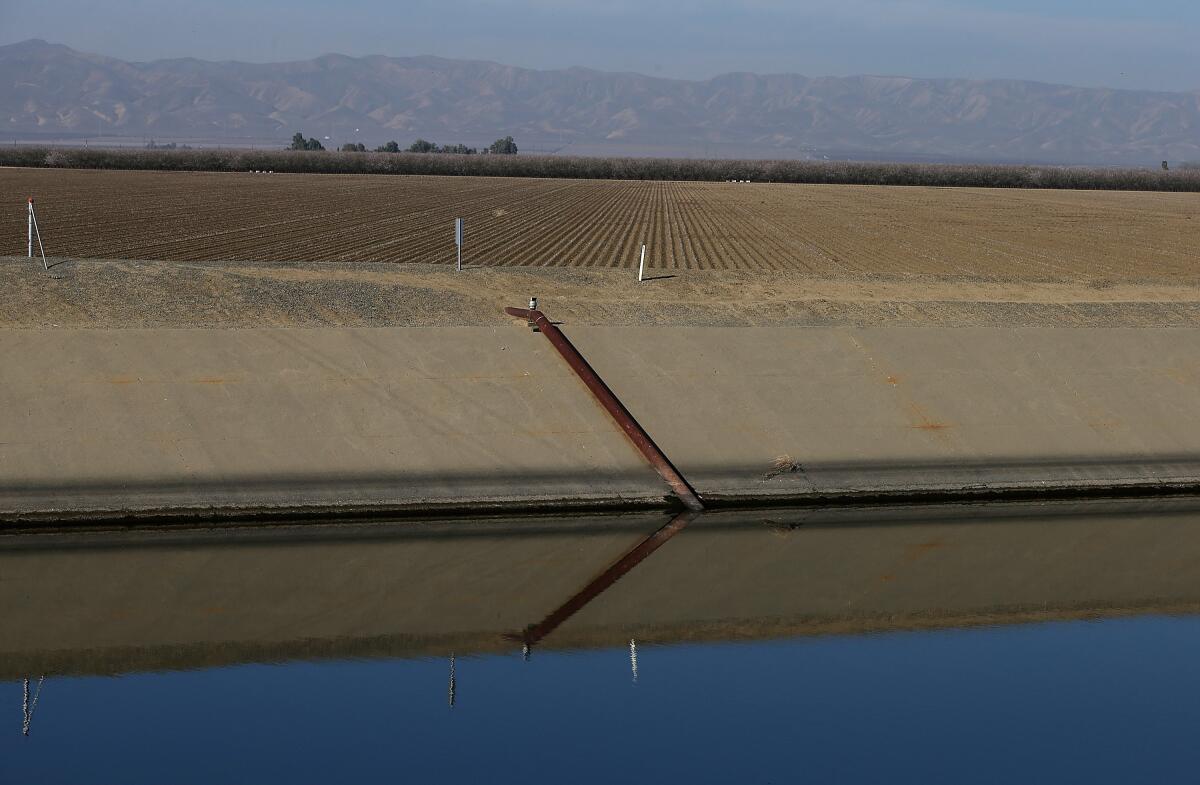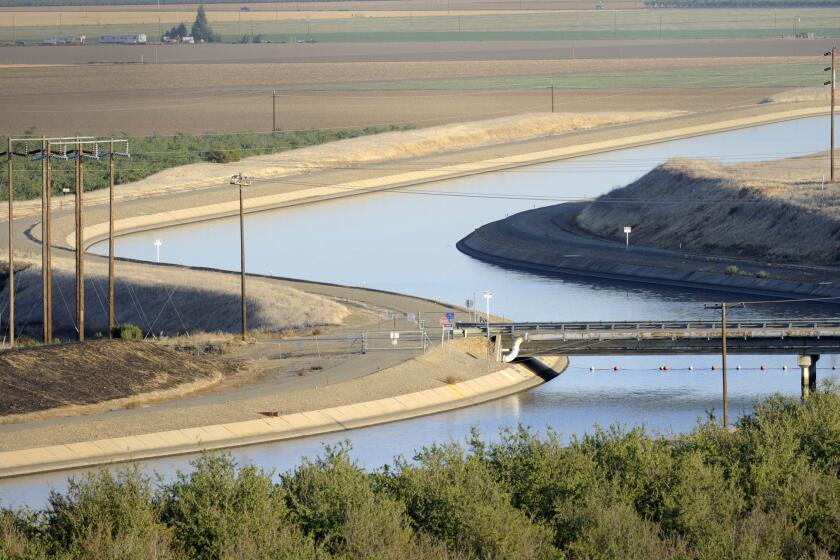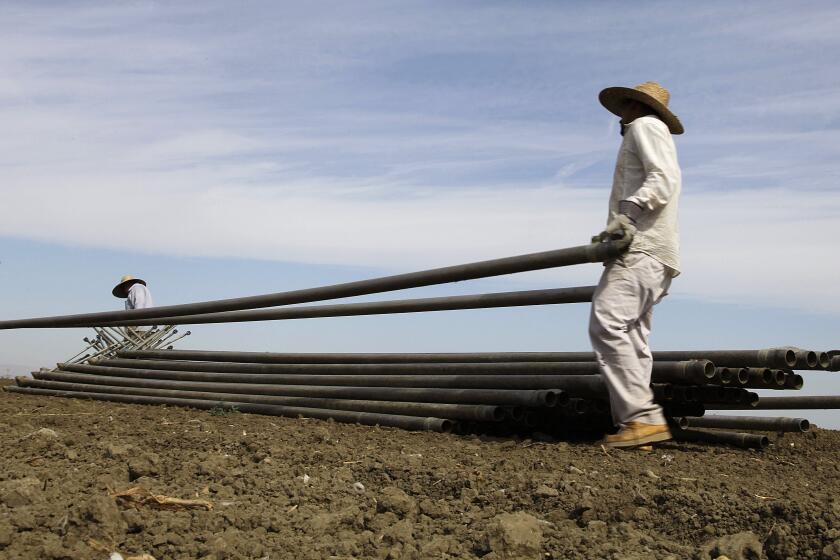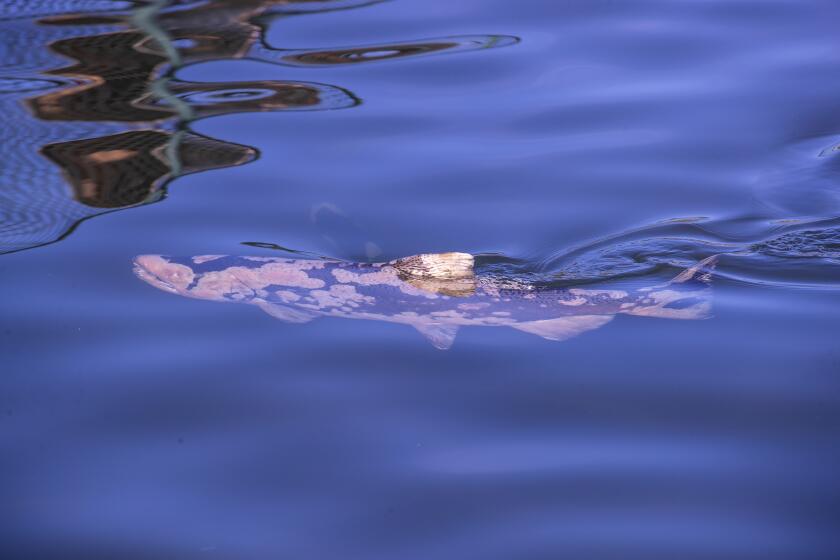Battle rages over ‘sweetheart deal’ between Trump administration and giant water district

Critics call it a “sweetheart deal” between the Trump administration and the Central Valley’s largest agricultural water district, and they claim it unfairly lines the pockets of major farm owners while imperiling California salmon and other fish species.
For the last three years, environmentalists, tribal activists and fishing groups have been battling in court to reverse a contract between the U.S. Bureau of Reclamation and the Westlands Water District. Among other provisions, the 2020 agreement grants Westlands permanent access to as much as 1.15 million acre-feet of water per year, more than double the amount of water that Los Angeles’ 3.9 million residents use annually.
Now, Westlands opponents are celebrating a legal victory they say puts them one step closer to invalidating the contract. A state Court of Appeal this week upheld a Fresno County Superior Court decision to deny Westlands’ request that a judge validate the contract.
“The whole thing was a ripoff,” said Adam Keats, a lawyer for California Water Impact Network and other groups. Keats said the deal surfaced during a time when David Bernhardt, who had represented Westlands as a lawyer and lobbyist, was Interior secretary under then-President Trump.
“We prevented Westlands from validating their contract. That was our goal,” Keats said. “And now we have a chance to reverse the contract.”
The Interior Department on Friday awarded Westlands Water District, a former client of Secretary David Bernhardt, a permanent entitlement to roughly twice as much water as the city of Los Angeles uses in a year.
In a statement, Westlands General Manager Allison Febbo said the district “continues to assess the ruling, but it is important to recognize that neither the Court of Appeal’s ruling nor the lower court’s judgment renders the contract invalid.”
Mary Lee Knecht, a spokesperson for the Bureau of Reclamation, declined to comment, saying the matter remains under litigation.
The water at the center of the dispute flows through the Central Valley Project, a federally operated system of reservoirs and canals that delivers water from the Sacramento-San Joaquin River Delta to farmlands. Westlands spreads across 600,000 acres in Fresno and Kings counties, and delivers water to producers of almonds, pistachios, tomatoes and other crops.
Stephan Volker, a lawyer representing North Coast Rivers Alliance, the Winnemem Wintu tribe and other groups, said the contract charges Westlands far too little for water.
“This is an enormous gift of public resources, scarce water resources, at the expense of environmental protection, so that a few entrepreneurs basically can reap enormous profits,” Volker said.
The three-judge appellate court agreed with a Superior Court judge’s ruling that the water district’s draft contract was “materially deficient in its failure to specify Westlands’ financial obligations under the anticipated contract.”
The environmental groups also have a related case pending in federal court and argue the government should be barred from delivering water to Westlands under the contract. Volker and others said in light of the latest decision, they hope Interior Secretary Deb Haaland will rescind the contract.
California judge declines to validate contract giving the nation’s largest agricultural water supplier permanent access to federally controlled water.
The significance of the ruling will depend on the response from the federal government, said Dave Owen, a professor at UC College of the Law in San Francisco.
“What this case does is give the federal government the option to back out of a contract and renegotiate it,” Owen said. “It makes the contract voidable. And that could be very significant if the federal government says, ‘We don’t like the contract, we think it was a mistake, we want to negotiate something new.’”
However, Owen said, the Bureau of Reclamation hasn’t given any indication it’s taking that position and has continued delivering water under the contract.
“I think if this litigation is going to eventually lead to changes in the amount of water that stays in rivers and the amount of water that Westlands gets, there’s probably a whole series of other dominoes that would need to drop,” Owen said.
Fishing and environmental groups have fought in court for years to limit the water Westlands receives from the delta.
Environmental advocates said that if the district had prevailed in the case, it would have been entitled to receive water without complying with certain limitations, including a 960-acre limit per landowner and higher pricing requirements. They said a victory for Westlands would have hindered efforts to restore water quality and the ecosystem in the delta, where they blame large water diversions for causing declines in salmon and other fish species.
Keats and other critics say they’re concerned not only about the effects of diverting the water from the delta’s ecosystem, but also about issues with selenium-tainted wastewater from Westlands fields, which in the 1980s caused bird deaths at nearby Kesterson National Wildlife Refuge. Instead of continuing to grow almonds and pistachios, he said, a better use for the land would be to cover it with solar panels.
“They should stop putting water in that ground, no matter what it produces in terms of food. It’s a terrible place to be irrigating,” Keats said.
California’s Chinook salmon population is suffering, forcing the cancellation of the fishing season along the Pacific coast.
John Buse, senior counsel at the Center for Biological Diversity, said the massive water diversions put the delta ecosystem at grave risk, and “these schemes to lock in permanent deliveries of California’s most precious resource are dubious and illegal.”
“We’d like to see the Bureau of Reclamation just set aside this contract and enter a new process with Westlands that looks at the full environmental consequences, including on salmon and Delta fish,” Buse said.
Westlands took advantage of a 2016 law to convert the district’s contract to an agreement that would secure a permanent water entitlement. The law allowed for such a change if agencies repaid what they owed the government for construction of the Central Valley Project.
Febbo pointed out that dozens of other water suppliers similarly sought new contracts under the process laid out in the 2016 legislation, which was signed by then-President Obama. She said that the contract remains valid and that the district has paid the federal government about $210 million as required under the agreement.
Beyond the dispute over Westlands’ contract, environmental advocates have called for an overhaul of how the Central Valley Project is managed, including how the costs are allocated. In a recent report released by the California Water Impact Network, former state water official Max Gomberg said the federal government’s method of allocating costs contains major flaws, and “the biggest omission is the environmental damage” caused by water diversions.
Gomberg said he believes the federal government should be charging all water users significantly more.
“The entire cost structure of this project is both deeply unfair and a contributor to why it does so much environmental damage,” Gomberg said. “The people who are responsible for the damage are the people who should be paying. And the way that this project has been operated, that hasn’t been the case.”










